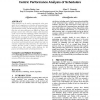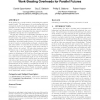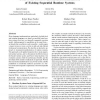2477 search results - page 10 / 496 » Parallelizing Functional Programs by Generalization |
132
click to vote
GECCO
2006
Springer
15 years 5 months ago
2006
Springer
Genetic Programming offers freedom in the definition of the cost function that is unparalleled among supervised learning algorithms. However, this freedom goes largely unexploited...
118
click to vote
HPDC
2007
IEEE
15 years 8 months ago
2007
IEEE
Utility functions can be used to represent the value users attach to job completion as a function of turnaround time. Most previous scheduling research used simple synthetic repre...
SPAA
2009
ACM
16 years 2 months ago
2009
ACM
Work stealing is a popular method of scheduling fine-grained parallel tasks. The performance of work stealing has been extensively studied, both theoretically and empirically, but...
103
click to vote
OOPSLA
2010
Springer
15 years 19 days ago
2010
Springer
Many language implementations, particularly for high-level and scripting languages, are based on carefully honed runtime systems that have an internally sequential execution model...
225
click to vote
ICFP
2009
ACM
16 years 2 months ago
2009
ACM
Purely functional programs should run well on parallel hardware because of the absence of side effects, but it has proved hard to realise this potential in practice. Plenty of pap...



